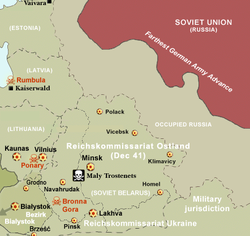Maly Trostenets
Maly Trostinek[cita requerida] o Maly Trostenets (en ruso: Малый Тростенец; en bielorruso: Малы Трасцянец, romanizado: Maly Trascianiec; en alemán: Vernichtungslager Maly Trostinez) fue un campo de exterminio nazi situado en Bielorrusia. Fue creado el 7 de mayo de 1942 y cerrado el 10 de enero de 1943. Se estiman en 206.000 los muertos en él. Estuvo dirigido por Karl Streibel.


Historia
editarMaly Trostinek era un campo dedicado al asesinato masivo de judíos bielorrusos así como los de las zonas de Minsk y de los alrededores. Es difícil saber con exactitud el número de víctimas en Maly Trostinek ya que los nazis destruyeron toda la documentación relativa tanto al campo como al personal S.S. y auxiliar destinado al mismo.
Si a mediados de julio de 1941 habitaban unos 400.000 judíos en Bielorrusia, se estima que el 80% fueron exterminados por asesinatos masivos en el bosque de Blagovshchina, en donde murieron unos 50.000 judíos y en el bosque de Shashkovka (a 5 kilómetros de Maly Trostinek) en donde se ejecutó a unas 100.000 personas, o por la deportación a otros campos de exterminio. Allí perecieron la soprano Grete Forst, la psicoanalista Margarete Hilferding y el sacerdote católico Vincent Hadleŭski.
Referencias
editarBibliografía
editar- Ernst Klee, Willi Dressen, “Gott mit uns”: Der deutsche Vernichtungskrieg im Osten, 1939–1945 (Frankfurt am Main, S. Fischer, 1989).
- Shmuel Spector, ‘Aktion 1005 — Effacing the Murder of Millions’, Holocaust Genocide Studies (Oxford)
- Paul Kohl, Der Krieg der deutschen Wehrmacht und der Polizei, 1941–1944: sowjetische Überlebende berichten
- Christian Gerlach, Kalkulierte Morde: Die deutsche Wirtschafts- und Vernichtungspolitik in Weißrußland 1941 bis 1944 (Hamburg, Hamburger Edition, 1999).
- Leonid Smilovitsky, ‘Ilya Ehrenburg on the Holocaust of the Jews in Belorussia: Unknown Evidence’, East European Jewish Affairs
- Hans Safrian, ‘Expediting Expropriation and Expulsion: The Impact of the “Vienna Model” on Anti-Jewish Policies in Nazi Germany, 1938’, Holocaust Genocide Studies (Oxford), vol. 14 (2000)
- [Ė.G. Ioffe, G.D. Knat’ko, V.D. Selemenev, comps.], Kholokost v Belarusi, 1941–1944
- [V.I. Adamushko, et al., comps.], Лагерь смерти “Тростенец”: Документы и материалы 2003) ISBN 985-6372-30-5].
- [K.I. Kozak, et al., eds.], Henatsyd u druhoĭ susvetnaĭ vaĭne: Prablemy dasledavanniya u pamiyats akhviyar Trastsiyantsa... (Minsk, Vydavetski tsentr BDU, 2003)
- S.V. Zhumar’ & R.A. Chernoglazova, comps., Trostenets (Minsk, GK ‘Poligrafoformlenie’, 2003 Library of Congress call No. D805.5.M358 T76 2003].
- Igor’ Kuznyetsov, ‘В поисках правды, или Трагедия Тростенца: до и после’ [In Search of Truth; or, The Tragedy of Trostenets: Before and After], Belorusskaya delovaya gazeta [Belarus Business News] (Minsk), No. 1416 2004 Minsk, 1999–2002)
- Petr Krymsky, ‘Тростенец — белорусский “Oсвенцим”’ Trostenets — Belarusian ‘Auschwitz’, Rossiĭskie vesti [Russian News] (Moscow), No. 16 (1771), May 11–18, 2005
- [Z.R. Iofe, et al., eds.], Laher smertsi Tras’tsyanyets, 1941–1944 hh.: pamiyatsi akhviyar natsyzma ŭ Belarusi [The Tras’tsyanyets Death Camp, 1941–1944: In Memory of the Victims of Nazism in Belarus]
- Poliakov, Leon. Harvest of Hate: The Nazi Program for the Destruction of the Jews of Europe Syracuse University Press, 1956
- Buscher, Frank. Investigating Nazi Crimes in Byelorussia: Challenges and Lessons Justiz und NS-Verbrechen
- Gerlach, Christian. Kalkulierte Morde. Die deutsche Wirtschafts- und Vernichtungspolitik in Weißrußland 1941-1944, Hamburg 1999
- Kohl, Paul. Trostenez - Das Vernichtungslager bei Minsk In: "Existiert das Ghetto noch? Weißrußland: Jüdisches Überleben gegen nationalsozialistische Herrschaft." Projektgruppe Belarus. Berlin-Hamburg-Göttingen 2003.
- Langenheim, Henning. Mordfelder Elefanten Press, Berlín 1999